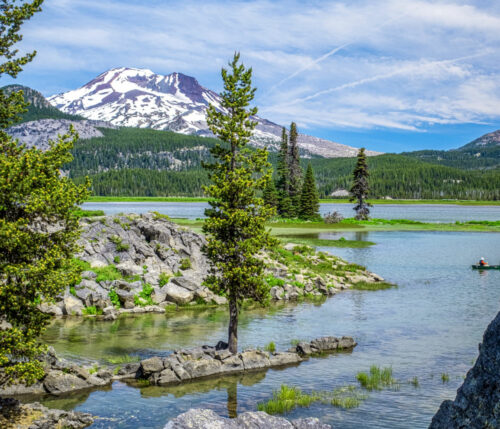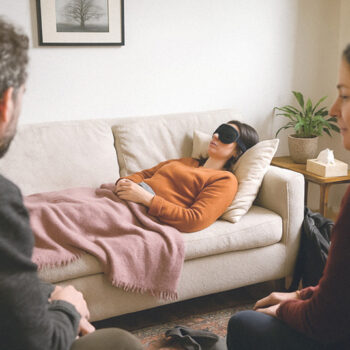Psilocybin Retreat Oregon USA

In the United States, about one in five adults lives with a mental health issue. Depression, anxiety, burnout… Getting help isn’t easy. More than half of those affected receive no treatment at all.The legalization of psilocybin retreats in Oregon is opening new avenues for healing and spiritual exploration.
Oregon’s Psilocybin Law
Legal Status
In 2020, Oregon made history with Measure 109 through a public vote. This made it the first U.S. state to allow supervised psilocybin use. The policy applies exclusively to non-medical therapeutic purposes.
To make this possible, the state built a strict regulatory system. The Oregon Health Authority (OHA) issues licenses, trains coaches, and inspects centers.
Psilocybin Retreats in Oregon
Adults aged 21 and over can book a psilocybin retreat at a licensed service center. To do so, they don’t need a medical prescription or a therapeutic diagnosis. But, participants must attend a mandatory preparation session. During this interview, a practitioner screens for contraindications.
Form of Consumption
Only naturally grown psilocybin mushrooms—like Psilocybe cubensis—are allowed. The authorities prohibit synthetic compounds and chemical extracts.
Cultivators must obtain licenses and comply with stringent hygiene and safety protocols. The requirements are comparable to medical-grade standards. The goal is to limit misuse and ensure safety.
Participants consume psilocybin orally, using either fresh or dried mushrooms. They sometimes combine them with neutral-tasting foods to facilitate intake.
The guidance team uses music, eye masks, and a carefully controlled sensory environment. These elements help foster a state of deep introspection, as in most psychedelic retreats in Oregon.
Dosage
Finally, the practitioners determine the dose based on the centre’s protocols or the participant’s tolerance.
- A low dose starts around 1 gram.
- A high dose can range from 3 to 5 grams.
Participants choose their dose based on the effects they wish to explore. The team often encourages first-timers to begin with lower doses or to spread their intake over several days. Some retreats include two guided ceremonies.

Psychedelic Therapy vs. Retreats in Oregon
Key Differences
In the world of psilocybin, there’s a clear distinction between retreats and assisted psilocybin therapy. Retreat organizers design the experience to support personal, spiritual, or introspective growth. They host the sessions in natural settings, with small groups.
Guides lead each journey and structure it around preparation, sharing, and integration. These settings aim to minimize emotional or physical risks. This is the model legalized in Oregon and the Netherlands.
By contrast, assisted therapy follows a clinical or para-medical approach. It involves licensed professionals. For example psychologists, psychiatrists, or psychotherapists. They integrate psilocybin into a structured, one-on-one protocol.
This kind of theray often targeting conditions like treatment-resistant depression, PTSD, or existential anxiety. Sessions are more spaced out, with a longer integration process.
What to Expect from a Psilocybin Experience
Psilocybin’s effects are well documented in clinical trials. But each person’s experience is unique.
The journey lasts around 4 to 6 hours, with a peak about two hours in. People often report visions, strong emotions, time distortion, and deep insights.
Some feel less depressed afterwards. Others gain clarity or make peace with past trauma.
But it’s not always easy. Psilocybin can also bring paranoia, fear, or emotional overwhelm. That’s where the support team plays a key role. They don’t steer the experience, but they offer calm, steady presence.
After the journey, the integration phase helps participants process and explore the experience’s deeper meanings. With the same facilitator or an independent therapist.
Psilocybin retreat Oregon vs. Netherlands: What’s Different?
| Oregon | Netherlands | |
|---|---|---|
| Structure | Psilocybin service centers | Psilocybin retreats |
| Substance | Magic mushrooms | Magic truffles |
| Dose | Moderate to high | Moderate to heroic |
| Duration | 4 to 7 days | 3 to 5 days |
| Staff | Formally trained & licensed facilitators | Informally trained, diverse |
| Legal Status | Fully legal since 2024 | Fully legal since 2008 |
| Cost | $3,000 to $8,000 | $1,700 to $3,900 |
| Advantages | Highly structured. U.S. legal framework. Oregon’s appeal. | Very human. Affordable. Experienced facilitators. Chance to explore Europe. |
| Drawbacks | High costs. Young institutions. Not ideal for public employees. | Travel planning required. Must choose center carefully. Distance from home: pro or con. |
Enjoy a 100% legal psilocybin experience in the Netherlands
Preparation and retreat in English
Enjoy a legal & intense experience in the Netherlands
A psychedelic retreat designed for best results. Small group, one-to-one preparation, experimented facilitators, 1 year monthly integration & awesome place !
Join us

The Substance
In Oregon, only psilocybin mushrooms grown under regulated conditions are legal. Producers must follow strict health and safety rules, with lab testing for potency and purity. Psilocybe cubensis is most commonly used.
The Dutch government banned magic mushrooms in 2008, but allowed magic truffles (sclerotia) to remain legal. Retreat organisers freely use them, even though their psilocybin content is lower.
The Protocol
Retreats follow a clear structure. They help participants step away from daily life. In Oregon, the state sets a strict protocol and enforces it closely.
Officials carry out inspections, check incident reports, and conduct audits. These rules push costs up.
In the Netherlands, the model is more informal and self-directed. With fewer regulatory requirements. Retreats tend to offer a more relaxed, warm, and spontaneous atmosphere. Emotional sharing often emerges naturally.
Integration circles are typically more flexible and open-ended. Most practitioners build their skills through hands-on experience or backgrounds in therapy or coaching. They do not undergo an official state training program.
The Cost
Prices reflect the structural differences. In Oregon, a stay may cost $3,000 to $8,000 depending on the duration, setting, and level of support.
In the Netherlands, a 3- to 5-day all-inclusive retreat typically ranges from $1,700 to $3,900. The lower cost reflects the absence of state regulation. But it also means quality and safety vary between centers.
How to Choose?
The cost difference between Portland and Amsterdam is significant. This is an example trip for a participant travelling from New York. The stay includes 5 retreat days and 6 days on-site to enjoy the scenery and rest.
🇺🇸 Oregon (United States)
- Retreat: $6,000
- Round-trip flight New York – Portland: approx. $209
- Hotel (5 nights): approx. $680 ($136 per night)
- Car rental (5 days): approx. $125 ($25 per day)
- Estimated total: $7,014
🇳🇱 Netherlands
- Retreat: $3,500
- Round-trip flight New York – Amsterdam: approx. $458
- Hotel (5 nights): approx. $655 ($131 per night)
- Car rental (5 days): approx. $255 ($51 per day)
- Estimated total: $4,868
On average, the trip is $2,146 cheaper in the Netherlands. That makes it an appealing option for those looking to combine psychedelic work with travel and adventure.
The retreat itself will often feel like a memorable summer camp—casual, social, and full of meaningful connections. And everyone in the Netherlands speaks fluent English.
On the other hand, Oregon may be easier to organize. You stay within your own country, which can feel more reassuring.
The protocol might come across as more formal or rigid if you’re seeking a strong sense of community. However, it’s ideal for people who benefit from clear structure and defined boundaries.

The Role of Safety
Psilocybin retreats in Oregon or the Netherlands share a key feature. They place safety at the centre of the experience. Staff are attentive before, during, and after the psilocybin session.
It starts with a strict screening process to eliminate medical risks—such as antidepressant use, psychosis, or heart conditions.
Preparation
Next comes the preparation phase, which includes individual or group sessions. The goal is to help participants identify the personal themes they want to explore. Depending on the retreat, several one-on-one conversations may take place during the stay.
This step plays a key role. It builds trust and emotional stability, which helps participants avoid a bad trip
Trip
During the psilocybin journey itself, the staff monitor the group and intervene if needed. They remain alert to signs of overwhelming emotions or physical discomfort such as nausea. Certain retreats also include the presence of a medical doctor or nurse on site.
Integration session
Finally, the process concludes with a series of integration sessions. The integration process may unfold over a week, a month, or even a year.
The integration session is a space to reflect on the experience. The work involves exploring possible interpretations and identifying personal insights. It also serves as a starting point for building new habits and bringing the experience into daily life.

Receive 1-year Integration Support
How to Foster Potential Life Changes? After the retreat, you join our integration circle for 1 year. Engage with the team and fellow participants, exchanging ideas on the strategies to implement.
Join us
Why Oregon?
It’s no coincidence that Oregon was the first state to legalize psilocybin retreats. The state has a long history of progressive policies:
- Removed criminal penalties for cannabis in 1973.
- Legalized euthanasia in 1997
- Ended criminal prosecution for drug possession in 2020 (Measure 110).
Portland, in particular, is a hub of psychedelic counterculture, where alternative communities, mental health startups, and academic researchers converge. But, the movement wasn’t spontaneous. Oregon Psilocybin Services first led the initiative.
Then, major figures like Dr. Rosalind Watts (formerly of Imperial College London) offered their support. Therapist Tom Eckert, co-author of Measure 109, also joined the effort.
Their goal: to create a safe, ethical, secular model. An approach that should bridge science, mental health, and personal experience.
Beyond Oregon: What Are Other States Doing?
Oregon paved the way, but other U.S. states have begun exploring different models. It’s a blend of local activism, academic research, and growing interest in psychedelics for mental health.
Colorado
In early 2025, Colorado became the second state to legalize psilocybin in a regulated framework.
Its new law includes:
- Decriminalization of personal use and possession of certain entheogens (psilocybin, ayahuasca, mescaline not from peyote).
- Creation of supervised “Natural Medicine Healing Centers.”
The law is less rigid than Oregon’s and may eventually allow personal cultivation. This opens the door to more community-based or indigenous-style rituals. Colorado’s model is more inclusive and holistic.
Massachusetts
Several cities—Cambridge, Northampton, Easthampton, and Somerville—have passed local resolutions permitting the personal use of psychedelic plants. Local authorities don’t prosecute personal possession or use of psilocybin in these areas.
California
California has long led the way in psychedelic research. Institutions like UCLA, UC Berkeley, and Stanford remain particularly active in this field. In 2019, cities such as Oakland and Santa Cruz took it a step further by legalise entheogens.
But in 2023, state senators blocked Bill SB 58, which aimed to legalize personal psilocybin use.
Other States
- Washington, D.C.: Passed Initiative 81, making enforcement of entheogen laws a low police priority.
- Michigan: Cities like Ann Arbor, Detroit, and Ferndale have decriminalized psilocybin.
- Connecticut & Texas: Launched clinical pilot programs, often involving veterans with PTSD.
- Hawaii: In 2023, the Senate reviewed a bill to legalize medical psilocybin. This one is still under discussion.
What’s Next for Psilocybin in 2025?
2025 could mark a turning point. Psilocybin is becoming a central issue in public health, scientific research, and political debate.
No Federal Legalization Yet
At the federal level, psilocybin remains a Schedule I substance under the Controlled Substances Act. Authorities group it with heroin unless clear evidence shows it isn’t addictive. That label suggests it has no medical use and a high risk of abuse.
But this stance is becoming harder to defend, given mounting scientific evidence.
In 2018 and 2019, the FDA gave “Breakthrough Therapy” status to two trials using psilocybin for treatment-resistant depression. Two major players in the field, COMPASS Pathways and the Usona Institute, led the studies.
However, federal recognition of non-medical, civilian use (as practiced in Oregon) remains unlikely in the short term. Even as the topic gains traction in Congress.
Author: The Tangerine Chronicles
Last updated on 4 February 2026





